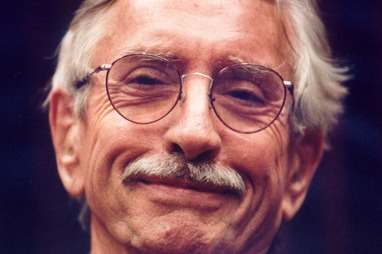With last week’s Philadelphia premiere of “At Home at the Zoo,” the Philadelphia Theatre Company revisited the first play ever written by legendary gay playwright Edward Albee.
Albee, 81, is best known for penning classics such as the Tony Award-winning “Who’s Afraid of Virginia Woolf?” and Pulitzer Prize winners “A Delicate Balance,” “Seascape” and “Three Tall Women.”
“At Home at the Zoo” expands upon Albee’s first play, “The Zoo Story,” which was written in 1958 and debuted in 1959. The one-act play involved Peter, an uptown publisher, who found himself thrust into a life-changing encounter on a Central Park bench with Jerry, a desperate outcast. “At Home at the Zoo,” which debuted in 2004, adds an introductory first act to the play and gives the audience a look into Peter’s home life.
“It always should have been a two-act play,” Albee said of “The Zoo Story.” “This is much better. I think that having the first act, where we understand more who Peter is and his relationship with his wife, when he does go to the park and is confronted by Jerry, we have a much clearer understanding of who he is and why he behaves the way he does. It defines Peter an awful lot more. I think it makes the whole thing a better play.”
Not everyone shares Albee’s opinions about the updated play, as the changes have been met with more than a few grumbles in the theater community. But it’s not like Albee gives a damn what they think.
“There are some people who feel possessive about things that don’t belong to them,” he said. “An awful lot of people love the new story. A lot of actors do because there’s one great starring role with a huge monologue in it, and everybody wants to play it too young. There’s an awful lot of 25-year-old kids who want to play Jerry, and Jerry is meant to be 40. Every young acting student wants to play Jerry because it’s a good role and they start getting possessive about it.”
Albee doesn’t see this new version as changing the original play, but rather as completing a story that wasn’t finished in the first place. He added he’s not planning on revising or adding to any of his other plays.
“I don’t believe in rewriting a play that I’ve written a long time ago because I’m not the same person,” he said. “I don’t have any plans at the moment, but you never know what’s going on in my strange head.”
Albee’s plays, especially his early works, have always offered a dark and satirical look inside the American dream, exposing the thinly veiled cruelty and social injustices underlying the supposedly normal everyday lives of married couples and the middle class.
“That’s all you can write about: life, death and the way that people interact in the filler in between,” he said. “I’m not going to let people off the hook. I would like them to interpret and receive what is there. There’s always some kind of social message in what I am writing, but no two people see the same play. Everybody sees what they want to see and there’s nothing you can do about that. You try hard to force people to see what you want them to see and sometimes you get there, sometimes you don’t.”
Because of the messages, Albee’s works often seem far more relevant today than when they were first written. But he doesn’t necessarily see his plays as being ahead of their time.
“Damned if I know,” he replied when asked if his plays are more significant now. “I have no idea. The isolation, the problems that people have relating socially and psychologically to other people is pretty much still the same, I guess. Plays have to have conflict, and you can’t have a good play with a bunch of people sitting around happy and enjoying themselves.”
Albee also isn’t quick to single out any play as a favorite or superior to another.
“I don’t think in terms of being proud of a play,” he said. “There are none of them that I am unhappy that I’ve written. I think they all have some usefulness. I have a 12-minute play I wrote called ‘The Sandbox’ that I didn’t make any mistakes in. In 12 minutes, it’s hard to make mistakes.”
Albee acknowledged his plays fare better now among critics than when they debuted.
“I find it interesting that when my plays come out and they get their first reviews, generally all of the views are 50-percent good, 50-percent bad,” he said. “Except for the more recent ones, the older plays got half-good and half-bad reviews. But when they are revived, the reviews keep getting better. Now that means one of two things: Either the critics are getting more intelligent and that the plays were always as good as they seem now, or they haven’t gotten any better and people are getting stupider.”
“At Home at the Zoo” runs through April 19 at Suzanne Roberts Theatre, 480 S. Broad St. For more information or tickets, visit www.philadelphiatheatrecompany.org or call (215) 985-0420.
Larry Nichols can be reached at [email protected].
